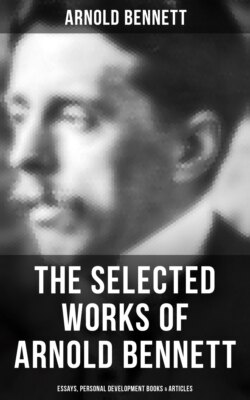Читать книгу The Selected Works of Arnold Bennett: Essays, Personal Development Books & Articles - Arnold Bennett - Страница 69
На сайте Литреса книга снята с продажи.
The Sustained Effort.
ОглавлениеIt is much easier to begin a novel than to finish it This statement applies to many enterprises, but to none with more force than to a long art-work such as a novel or a play. In the first place, a novel or a play should raise an interesting issue, and settle that issue in a convincing and satisfactory manner. And obviously the former part of the task presents fewer difficulties than the latter. Herein lies the reason why the last act of an average play is nearly always the worst, and why more people read the first chapter of a novel than read the last. In the second place, the sustained effort necessary for the composition of a novel or a play is really very considerable. Even the twenty thousand words of a four-act play cannot be decently achieved by an intelligence that has not been self-trained to stedfastness. And the eighty thousand words’ of a novel imply extraordinary dogged perseverance in an exhausting emotional endeavour. Instead of losing power as he proceeds, the novelist must be continually drawing on his reserves for additional power. He must “work himself up” at the start, and not once can he allow himself to descend from the lofty plane of emotional excitement on which alone creative work is properly accomplished. He cannot see all his work at once as the painter sees his canvas. Imagine the technical difficulties of a painter whose canvas was always being rolled off one stick on to another stick and who was compelled to do his picture inch by inch, seeing nothing but the particular inch which happened to be under his brush. That difficulty is only one of the difficulties of the novelist.
I mention these things in order to emphasise the formidableness of the novel. The beginner should not commence his first novel without the consciousness of a high resolution. He must dwell on the immensity of that which he has undertaken. He must gird his loins for the journey. He must eat the literary passover. He must take breath for the plunge. He should feel as a man feels who has determined to propose to a woman, or to give up smoking, or to save half his income. If he omits these preliminary mental formalities, if he forgets to furnish himself in advance with a great stock of resolution, perseverance, and energy, the chances are in favour of a fiasco, with consequent loss of self-respect and self-confidence.
It cannot be too fiercely insisted upon that a novel which is begun casually during a brief period of leisure and lightly taken up from time to time as occasion serves, will never be a good novel. While a novelist, especially a beginner, is writing a novel, the novel must be “on his mind,” and it must be waiting for him at the back of his intelligence even when he is engaged on other things. It must keep him awake at nights, and wake him after he has gone to sleep. It must intrude itself on his attention, must be his hourly companion, like a profound grief or anxiety. I say “grief or anxiety” rather than joy. For it is a fact that few novelists enjoy the creative labour, though most enjoy thinking about the creative labour. Novelists enjoy writing novels no more than ploughmen enjoy following the plough. They regard the business as a “grind”; some of the most successful hate their profession; some of the greatest artists in fiction have never found themselves able to write except under absolute exterior compulsion. Whereas some of the least gifted novelists are known to find a mild pleasure in their work. Hence the beginner who begins with ardour and then discovers that the zest quickly fades, should not argue therefrom that he has no vocation; he should rather nerve himself and set his teeth and clench his hands for a continuance of effort. The mysterious impulse which drove him to begin is a better proof that he has the vocation than his disgust and repulsion in the midst of the task are a proof that he has it not. There are moments in the working-day of every novelist when he feels deeply that anything — road-mending, shopwalking, housebreaking—would be better than this eternal torture of the brain; but such moments pass.
The best proof of a vocation for the novel is that abstention from fictional composition should produce a feeling of uneasiness, dissatisfaction, and guilt. A talent never persuades or encourages the owner of it; it drives him with a whip.
